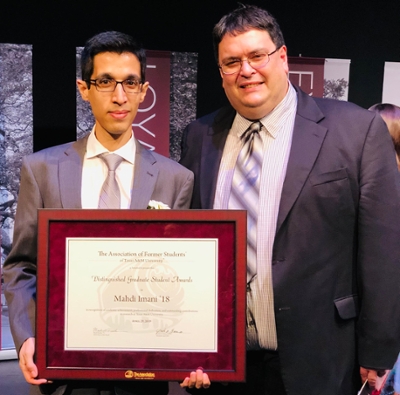
Mahdi Imani, doctoral student in the Department of Electrical and Computer Engineering at Texas A&M University, was recently named one of seven graduate students in the Texas A&M College of Engineering to receive the Association of Former Students Distinguished Graduate Student Award for Excellence in Research-Doctoral.
Imani recently defended his dissertation and will graduate in May. Afterward, he has an assistant professor position lined up in the Department of Electrical and Computer Engineering at George Washington University.
During his time at Texas A&M, Imani has worked in Dr. Ulisses M. Braga-Neto’s lab. His research has focused on machine learning, control theory and signal processing. He has developed sets of optimal and efficient tools for modeling, diagnosis and treatment of cancers.
“We’re looking for scalable and efficient mathematical tools for modeling and understanding the complex underlying cell process,” Imani said. “If you understand that, then we have taken a big step toward effective diagnosis and prognosis of cancer.”

Cancer is one of the leading causes of death in the world, and Imani said developing effective tools for accurate diagnosis and treatment of cancers at an early stage can significantly reduce the amount of pain people experience and reduce medical costs.
“The advancements in technology have enabled acquiring informative data from these biological processes,” Imani said. “How to model the complex dynamical behavior of these systems and move toward personalized treatment of various types of cancers seem more and more reachable.”
Imani studied at the University of Tehran, Iran, for his undergraduate and master’s degrees, switching from mechanical engineering to electrical engineering.
“Engineering has been greatly impacted by advancements in computational power and mathematical modeling,” Imani said. “We are trying to address some critical problems that can significantly impact our society.”
In addition to the award from the Association of Former Students, Imani received the Best junior Ph.D. Student Award from the electrical and computer engineering department in 2015 at Texas A&M. In 2018 he was the single finalist nominee of the electrical and computer engineering department for the Outstanding Graduate Student Award in the College of Engineering at Texas A&M. He also received the best paper finalist award at the 49th Asilomar Conference on Signals, Systems and Computers in 2015.